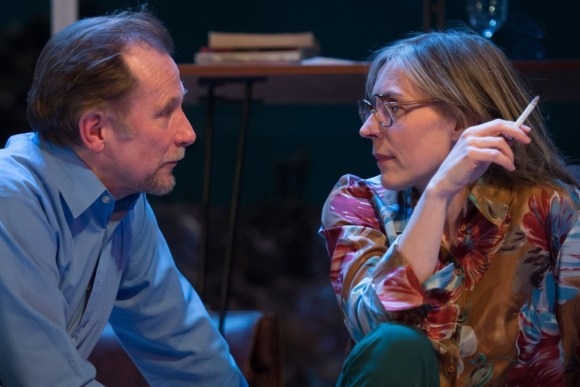Catherine Love: Why all the walkouts?
If audiences are walking out of shows more often, as has been suggested recently, perhaps we should be asking why

© Manuel Harlan
So what’s behind all these speedy exits? Lawson would have us believe that it’s British theatregoers’ prudish objection to explicit sexual content and inability to cope with formal experimentation. To this end, he limits his examples to the Royal Court, pointing to the high number of walkouts during The Mistress Contract and In The Republic of Happiness. Yet something doesn’t quite add up. Why should these productions be so shocking and objectionable on a stage that has seen work from the likes of Edward Bond, Mark Ravenhill and Caryl Churchill?
Here I have to admit that I myself have never yet walked out during a performance (I’m more of a fan of the slow hand clap). But were I not a) a critic, and b) terminally polite, I could summon up a whole list of performances at which I would have happily vacated my seat. And in not a single one of those was it because I was shocked by what I saw on stage, either in terms of content or form. More often it was because the show in question was poorly executed, clumsy to the point of offensive with its material, or just plain boring.
While I’m not suggesting that my response is representative of theatregoers at large, what I hope this does demonstrate is that audience members’ reasons for leaving a show are likely to be many, varied and not easily generalised (as a quick glance at the comments on Lawson's article seems to confirm). To argue that all those theatregoers walking out are simply turned off by explicit or experimental content is to vastly simplify and undermine their responses. Reacting to the article on Twitter, fellow critic Matt Trueman said:
The better question, to my mind, is whether today’s audiences are less inclined to tolerate boredom (and talkiness) in the theatre.
— Matt Trueman (@matttrueman) March 5, 2014
It may be that, as Trueman suggests, audiences today simply expect more from the theatre they see and are less likely to put up with it if it fails to meet those expectations. This is perhaps partly a result of the explosion of interactive and immersive theatre in recent years; more than one theatre-maker has suggested to me that audiences now expect their theatrical encounters to be more of a two-way street. But in all likelihood, there are a whole constellation of different reasons why today’s audiences might be less reticent about leaving their seats. For a start, theatre has to contend with more and more demands on our leisure time. If you have a Breaking Bad box-set to catch up with at home and a show really isn’t doing it for you, perhaps getting up and leaving is the wisest choice.
I also wonder if audience walkouts are always such a bad thing. Tim Crouch‘s 2009 show The Author, again at the Royal Court, relied on at least one walkout every night, as a plant exited the audience at an early stage in the proceedings. Crouch has explained that this was important as a signal to other audience members; in a show that relied on pushing its content and the audience’s complicity with that content, walking out always had to be an option, meaning that staying in your seat was an active choice. Those who did walk out later in the show (and there were several) were demonstrating a completely valid response to the situation Crouch had set up.
Perhaps, rather than simply dismissing them as the result of prudish, conventional tastes, theatre commentators – and, more importantly, makers – should think more carefully about why theatregoers are walking out. Then, maybe, they can work out how to keep them in their seats.












